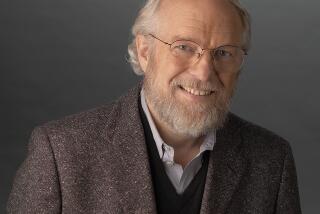Saving the world from paper tyranny
- Share via
Nien-Ling Wacker’s passion for her invention borders on the religious.
She talks about a “dream” that became a “movement.” Many people “believe,” but there are more to be brought out of the “dark age.” Those who spread the word are “evangelists” -- otherwise known as customers.
Laserfiche is no lifesaving vaccine or cure for social ills. It’s software that allows for the scanning and indexing of documents and, by employing optical character recognition technology, enables users to search all the text on every page.
The way Wacker sees it, with Laserfiche she’s bettering human existence by freeing the office masses, not to mention the recycling bins.
“One piece of paper is very easy to use, but a million pages is a problem. It becomes a black hole,” she says. “I decided to make a machine that will suck in all the paper.”
Wacker’s customer list includes all three branches of the U.S. government, Mexico’s immigration authorities and Saudi Arabia’s social security administration. Lawyers the world over rely on Laserfiche to dig through thousands of pages in litigation, and she says the CIA used it in bringing its case against former Panamanian dictator Manuel Noriega.
When the Chinese-born entrepreneur conceived the idea, the world didn’t seem ready to let go of its dependence on paper. Persuading people back in 1987 to try the first version of Laserfiche, designed to run on the old Microsoft disk operating system, was “like trying to get a plant to grow on a rock,” she says.
As one of her first customers, Jack Adams, puts it, “She thinks a long time ahead. In fact, she was too ahead of the curve.”
Adams, then a lawyer for Executive Life Insurance, decided the insurer should give Wacker $80,000 for a custom document managing system. It did, and before long he was on the Laserfiche payroll as its legal counsel.
He watched the company grow slowly. The product “is not like YouTube or one of these things that take off like a rocket,” he says. “It’s not sexy; it’s inside office management stuff.”
For seven years, Laserfiche lost money. No matter. Wacker has what Adams calls a “stick-to-itiveness.”
When her life savings and investments from friends and family ran out, she borrowed from her in-laws. Then she poured her children’s college funds into the company.
Her husband, Chris, supported her through it all. He says he never doubted the business would take, because he had experienced firsthand the need for a system like Laserfiche.
“I’m disorganized by nature,” Chris Wacker says. When he worked years ago for a construction company in Saudi Arabia, he had to contend with tens of thousands of pages of contracts, orders, drawings and memorandums for any given project. He knew his wife had very good business plan.
In 1994, Laserfiche broke even for the first time. Since then, sales have climbed annually, the Wackers say, at about 35%.
Nien-Ling Wacker doesn’t seem completely at home in her role as chief executive of a 180-employee company. Speaking at a recent conference of Laserfiche users and resellers, Wacker uncomfortably winced at the bright spotlight, fumbled with PowerPoint slides and repeatedly apologized for not being able to orate like Barack Obama.
After all, her aspirations were never in business. When she was young, she wanted to win the Nobel Prize; as a girl in Shanghai, she saw a documentary on French scientist Marie Curie and decided to become a physicist.
That took her to Australia, where she studied physics at the University of Melbourne, briefly working there as a systems analyst and programmer. In 1968, Wacker and her first husband moved to Los Angeles, where she got a master’s degree in chemical physics at USC, for which she went to work as a computer sciences instructor and consultant.
Then in 1973, her son Tom, 3 at the time, developed asthma, and Wacker quit so she could spend more time with him and her younger son, Peter. She designed software from home and launched Compulink Management Center Inc., a custom software solutions company that is the parent of Laserfiche.
Wacker, like her husband, is a self-described disorganized person. Her desk in her Long Beach office is covered in paper. But, she points out, there are absolutely no filing cabinets.
Wacker says her biggest competitors aren’t other document management software makers or computer giants like Hewlett-Packard Co. or Microsoft Corp.
She’s still trying to pry away market share from paper and filing cabinets. People are resistant to changing their work routine, and Wacker says it doesn’t help that her primary customers are bureaucrats, not the most forward-looking bunch.
At the current rate, paper and filing cabinets may have a good reason to feel threatened. Although she is past 60 and has grandchildren, Wacker says she doesn’t plan to retire any time soon.
--
--
(BEGIN TEXT OF INFOBOX)
Ahead of her time
Name: Nien-Ling Wacker
Job: CEO of Compulink, parent of Laserfiche, a paperless document managing company
Education: Bachelor of science in physics, University of Melbourne; master of science in chemical physics, USC
Pet peeve: Papers that get misfiled and become lost forever in filing cabinets
Hobbies: Ping-Pong (was captain of her college team), Sudoku, skiing, hiking, traveling, snorkeling in the Red Sea
Personal: Oldest of nine children, with five brothers and three sisters. Two sons, Tom, 38, and Peter, 33, and two grandchildren. Lives in Long Beach with husband Chris and terrier Elkie
Childhood idol: French scientist Marie Curie
More to Read
Sign up for Essential California
The most important California stories and recommendations in your inbox every morning.
You may occasionally receive promotional content from the Los Angeles Times.













